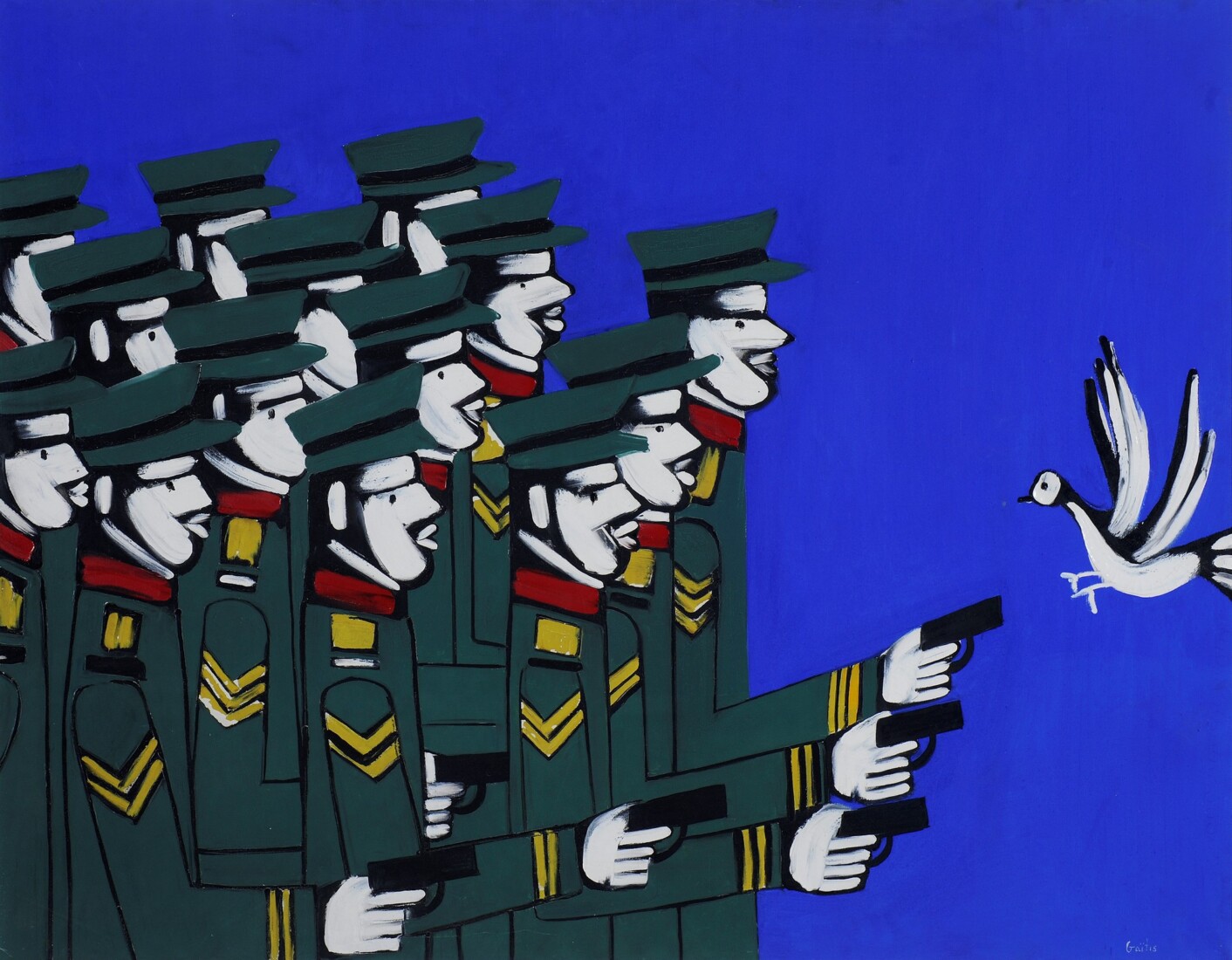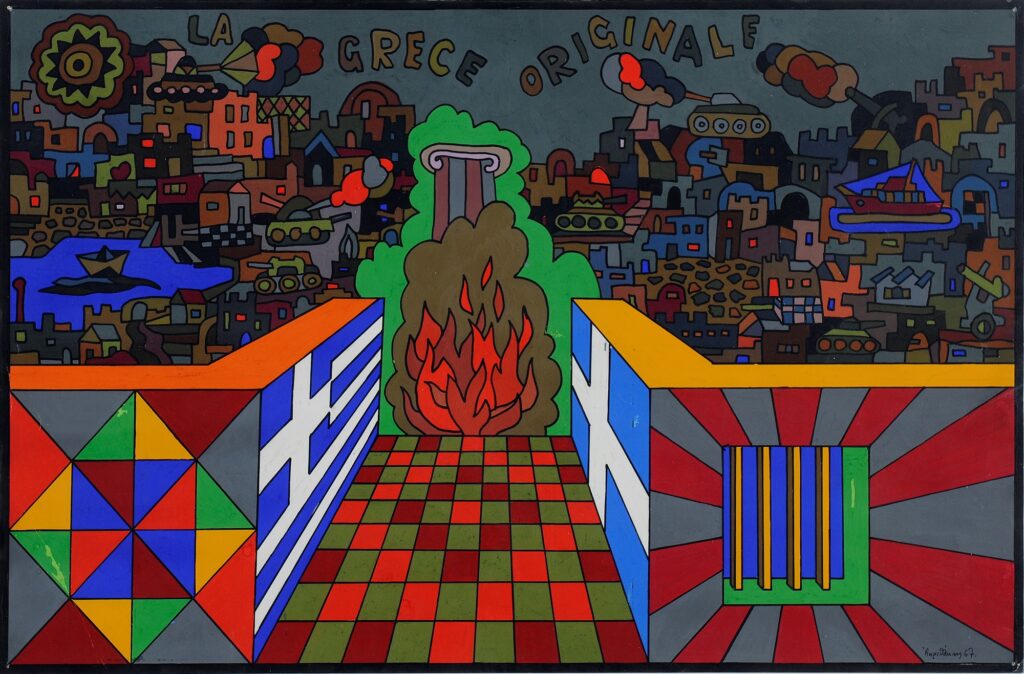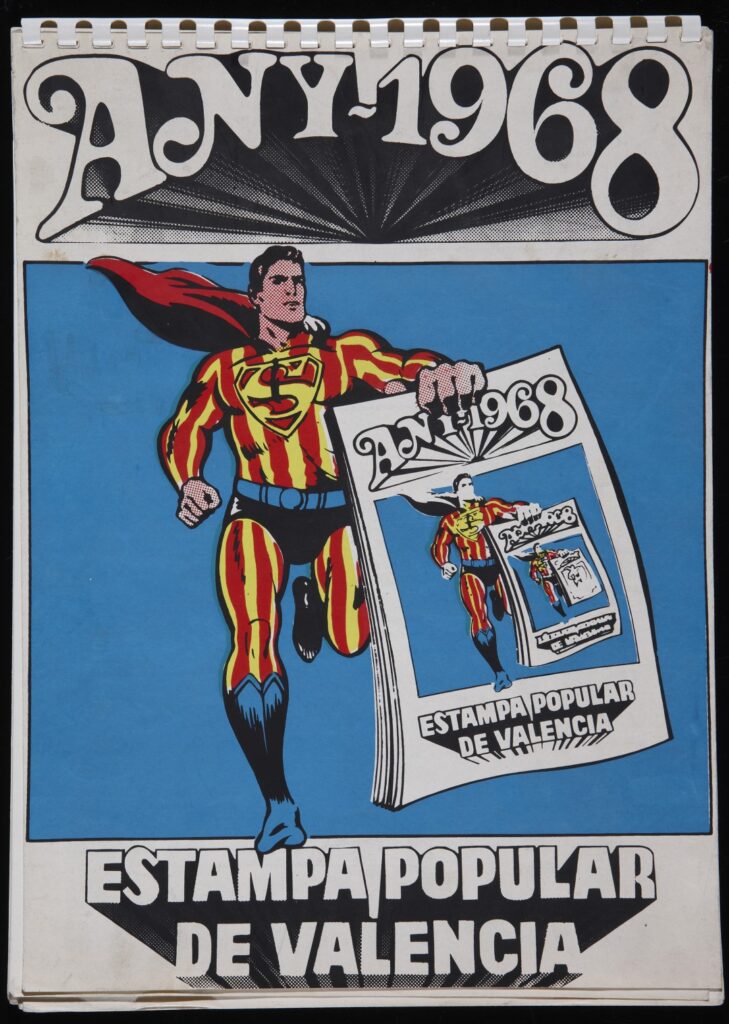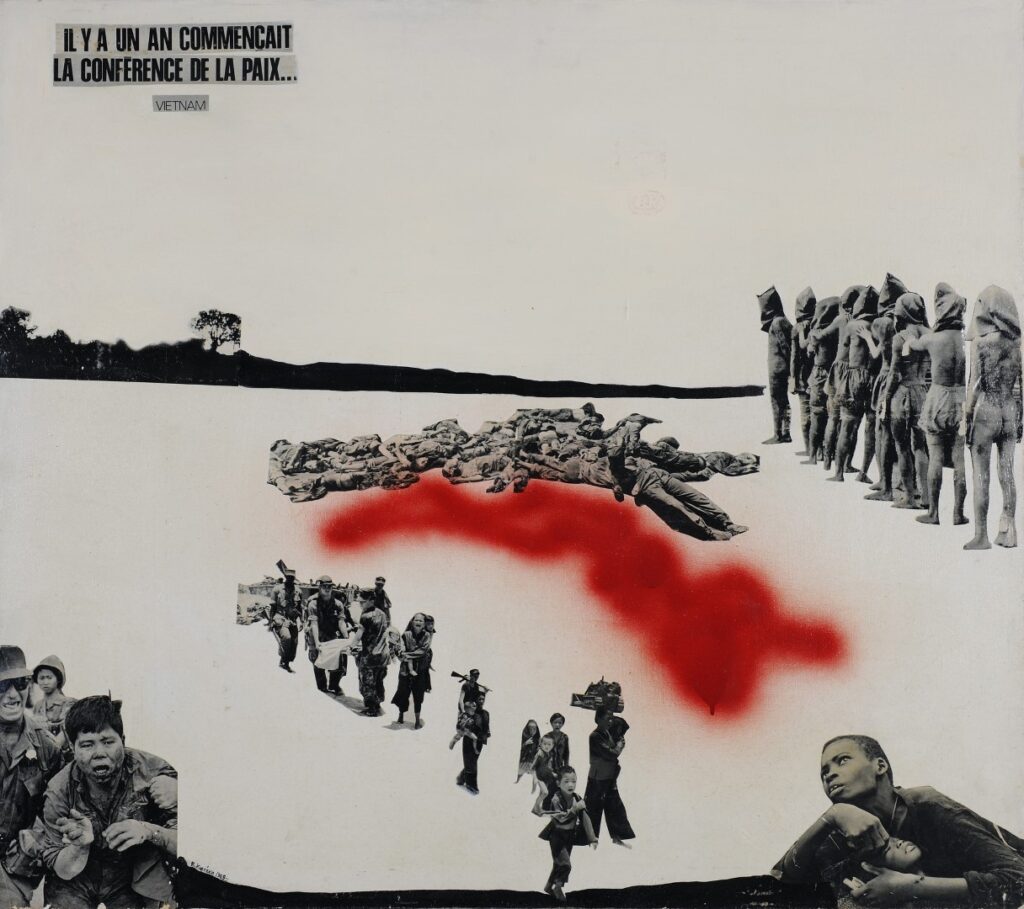
From 11.07.2024 to 02.02.2025
Yannis Gaitis (1923–1984) Murdering Freedom or The Colonels, 1968 Oil on canvas, 114 x 146 cm Panos C. Moschandreou Collection Photo Credit: Thodoris Fritzilas
- As nearly half the world goes to the polls in 2024 in a historic year of elections, the National Gallery of Greece in Athens unveils a timely exhibition on art, social change, and democracy.
- This is the first major exhibition to explore artistic responses to the struggles against authoritarian rule and pursuit of democracy in 1960s-70s Greece, Spain, and Portugal.
- It marks the 50th anniversary of the restoration of democracy in Greece.
- Featuring 140 works by 55 artists, brought together in collaboration with the Museo Nacional Centro de Arte Reina Sofía – MNCARS, Museu d’Art Contemporani de Barcelona – MACBA, Centro de Arte Moderna Gulbenkian, Centro de Estudos Multidisciplinares Ernesto de Sousa and private collections from Greece and Portugal.
The National Gallery – Alexandros Soutsos Museum presents Democracy, a timely new exhibition in Athens exploring the intersection of art and political history in Southern Europe. Running from 11 July 2024 to 2 February 2025, this is the first major international exhibition to examine the political role of art during the pivotal period in Southern European history as Greece, Portugal and Spain transitioned from authoritarian to democratic rule during the 1960s to 1970s.
The large-scale presentation brings together 140 masterpieces by 55 artists and artist groups, showcasing a diverse range of styles, perspectives, and practices. It explores how artists were inspired by and depicted the struggle against the era’s dictatorial regimes and the new cultural expressions and creative practices that evolved during the pursuit of civil liberties, including the rise of critical realism and abstract art, as well as the emergence of performance and conceptual art. The formation of artistic collectives, the art of protest in posters and prints, the politics of the body and the involvement of art in the public sphere all underscored the demand for democracy in the realm of the arts, providing a vibrant field for creative research and activity.
The National Gallery aims to reflect on the current socio-political state of the world and its resonance with the conflict and turmoil of 1960s and 1970s Southern Europe. Against the backdrop of a historic year of global elections and challenges to democratic values, the exhibition traces the shared cultural experiences, emotions, and trauma shaped by disruption, acts of protest, defiance, and resistance, that are just as relevant today as they were fifty years ago.
The year 2024 marks the fiftieth anniversary of the restoration of democracy in Greece in 1974. Half a century of unbroken parliamentary democracy followed the overthrow of the seven-year military dictatorship – a historic milestone that defines the beginning of the Metapolitefsi era in Greece. In the same year, the Carnation Revolution in Portugal restored democracy after almost half a century of António de Oliveira Salazar’s dictatorship, while November 1975 marked the death of General Francisco Franco, bringing about the end of Spain’s Francoist Regime (1936–1975). Inspired by the continuities, fissures, and upheavals from these three countries’ paths to democratisation, the exhibition explores the creative textures, colours, sounds, and compositions as artists responded to the trauma of dictatorship, the demand for democratic rights, and this period of radical transformation.
Syrago Tsiara, Curator and Director of National Gallery says “We proudly present our landmark exhibition on Democracy and Art in Greece, Spain, and Portugal, showcasing powerful artistic responses to repression and the fight for freedom. This exhibition prompts reflection on our historical experiences, achievements, and their impact on our collective identity and future. Amid rising extremist voices, declining voter turnout, and growing scepticism towards institutional credibility, it serves as a poignant reminder of the ongoing need to defend democracy. In these challenging times, museums and art play a vital role beyond solace, empowering profound engagement with imagery, ideas, and critical questions that shape our social interactions and coexistence.”
The journey to democracy begins with identifying the opponent. Visitors start in the “Facing the Enemy” section, where artists depict the protagonists of dictatorial regimes and their avengers—the rebel heroes and angry mothers who symbolised the uprisings.
“Resistance” showcases artistic responses to protests against repressive policies, capturing the wrath and mourning of political persecution victims. Whether explicitly or implicitly, the body—subjected to violence, resisting, and clashing—becomes the primary canvas for portraying the historical experience of dictatorship.
“Uprising” highlights moments of historical rupture, such as student reform movements and the fight for democratic public spaces. The Athens Polytechnic Uprising stands out for its extraordinary seminal power, inspiring a vast and enduring array of visual accounts.
In the final section, “Arousal,” grief and trauma are given free rein; sorrow, indignation, and rage give way to joy and excitement for the freedoms gained. This section focuses on the body, gender, and identity politics as democracy blooms through individual and collective bodies, celebrating participation, presence, pleasure, sensuality, and emancipation through performance art, dance, and conceptual art.
The show is a collaboration with prestigious private and public Greek, Spanish and Portuguese organisations, collectors and artists, including the Museo Nacional Centro de Arte Reina Sofía (MNCARS), Madrid; the Museu d’Art Contemporani de Barcelona (MACBA); the Centro de Arte Moderna Gulbenkian (CAM), Lisbon; the Centro de Estudos Multidisciplinares Ernesto de Sousa, Lisbon; the National Museum of Contemporary Art (EMST), Athens; the Contemporary Social History Archives (ASKI), Athens; and the National Bank of Greece Cultural Foundation (MIET), Athens.
Curated by Director Syrago Tsiara, Democracy builds upon the National Gallery’s previous exhibition Urbanography, which explored the transformation of the urban experience in the early post war decades. Tsiara is a renowned art historian and curator with extensive experience in the relations between art, politics, memory and identity. Democracy will be accompanied by a dynamic programme, including a conference, public lectures, workshops, book presentations, film screenings, and debates.
Featured artists:
Agrupación de Plásticos Jóvenes, Cristóbal Aguilar, Alexis Akrithakis, José Antonio Alcácer Garmendia, Dimitris Alithinos, Fernando Almela, Francisco Álvarez, Manel Armengol, Eugènia Balcells, Fernando ‘Coco’ Bedoya, Fernando Botero, Chronis Botsoglou, CADA, Manuel Calvo, Vlassis Caniaris, Cleopatra Dinga, Equipo Crónica, Yannis Gaitis, Carlos Gentil-Homem, Èulàlia Grau, Yannis Hainis, Ana Hatherly, Giorgos Ioannou, Niki Kanagini, Iro Kanakaki, Lefteris Kanakakis, Tilemachos Kanthos, Christos Kapralos, Maria Karavela, Kyriakos Katzourakis, New Greek Realists (Chronis Botsoglou, Cleopatra Dinga, Vasso Katraki, Kyriakos Katzourakis, Dimosthenis Kokkinidis, Vasso Kyriaki, Jannis Psychopedis, Yannis Valavanidis), Alekos V. Levidis, Konstantinos Malamos, Dimitris Mytaras, Rika Pana, Leda Papaconstantinou, Konstantinos Parthenis, Dimitris Perdikidis, Paris (-Alexandros) Prekas, Jannis Psychopedis, Joan Rabascall, Paula Rego, Giorgos Sikeliotis, Nikias Skapinakis, Dimos Skoulakis, Alberto Solsona, Ernesto de Souza, Tassos (Anastasios Alevizos), Thodoros (Papadimitriou), Manolis Tzobanakis, Giorgos Vakirtzis, Yannis Valavanidis, Marios Vatzias, Jaume Xifra


Ιδιωτική Συλλογή (Πορτογαλία)
Φωτο: José Pessoa / Museus e Monumentos de Portugal, E.P.E – Arquivo de Documentação Fotográfica


Estampa Popular de Madrid (1959–1981) La detención, 1962 [The Arrest] Woodcut on Somerset paper, 39 x 53 cm © Museo National Centro de Arte Reina Sofia AD05886 Photo Credit: Photographic Archives Museo Nacional Centro de Arte Reina Sofia

1968 Photographic collage, acrylic, red spray paint, 100 x 110 cm Collection of the artist Photo Credit: Thanos Kartsoglou

